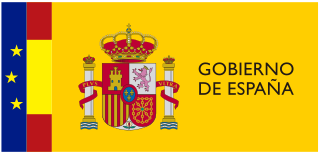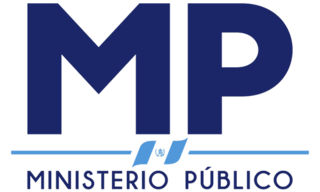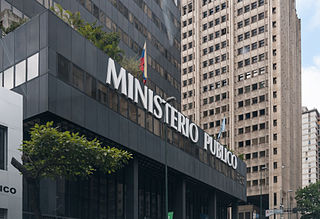Related Research Articles

A prosecutor is a legal representative of the prosecution in states with either the adversarial system, which is adopted in common law, or inquisitorial system, which is adopted in civil law. The prosecution is the legal party responsible for presenting the case in a criminal trial against the defendant, an individual accused of breaking the law. Typically, the prosecutor represents the state or the government in the case brought against the accused person.

The government of Spain is the central government which leads the executive branch and the General State Administration of the Kingdom of Spain.

The Attorney General Office is a cabinet-level position in the Brazilian government charged with advising the Executive Branch and representing the federal government of Brazil in legal proceedings legally known as the Union (União). The Attorney General is defined under the Article 131 of the Brazilian Constitution as one of the essential functions of Brazilian judicial administration, along with the roles performed by the judicial branch, the Prosecutor's office, the public defenders and private lawyers. The current Attorney General is Jorge Messias.

The Public Prosecutor's Office is the Brazilian body of independent public prosecutors at both the federal and state level. It operates independently from the three branches of government. It was once referred to by constitutional lawyer and former president Michel Temer as a "Fourth Branch". The Constitution of 1988 divides the functions of the Public Prosecutor's Office into three different bodies: the Public Procurator's Office, the Public Defender's Office and the Public Prosecutor's Office itself, each one of them an independent body. In addition to that, the new Constitution created the Federal Court of Accounts, which is also autonomous in its functions.

The Public Prosecution Service is the body of the Judiciary of Portugal responsible for the public prosecution and the representation of the State before the courts. It is an hierarchic organized body, composed of magistrates and headed by the Procurador-Geral da República.
The legal system of Chile belongs to the Continental Law tradition. The basis for its public law is the 1980 Constitution, reformed in 1989 and 2005. According to it Chile is a democratic republic. There is a clear separation of functions, between the President of the Republic, the Congress, the judiciary and a Constitutional Court. See Politics of Chile. On the other hand, private relationships are governed, mainly, by the Chilean Civil Code, most of which has not been amended in 150 years. There are also several laws outside the Code that deal with most of the business law.
The Public Prosecutor's Office of Costa Rica is the authority responsible for the legal prosecution of criminal acts within the state's legal system. It organises the investigation and prosecution of crimes affecting broader society. In investigating crimes, it works jointly with the Judicial Investigation Department.

Lesbian, gay, bisexual, and transgender (LGBT) people in Paraguay face legal challenges not experienced by non-LGBT residents. Both male and female types of same-sex sexual activity are legal in Paraguay, but same-sex couples and households headed by same-sex couples are not eligible for all of the same legal protections available to opposite-sex married couples. Paraguay remains one of the few conservative countries in South America regarding LGBT rights.

The Attorney General of Guatemala is the chief public prosecutor and head of the Ministerio Público of Guatemala.

Luisa Marvelia Ortega Díaz is a Venezuelan lawyer. Between December 2007 and August 2017, she served as the Prosecutor General of Venezuela. A proponent of the Chavismo ideology, Ortega Díaz was fired as Prosecutor General on 5 August 2017 by the Supreme Tribunal of Justice and the Constituent National Assembly (ANC) promoted by Nicolás Maduro, following a breaking with the Maduro government as a result of the 2017 Venezuelan constitutional crisis in the context of the crisis in Venezuela. This dismissal was rejected by the opposition-led National Assembly of Venezuela, arguing that only that institution had the power to carry out said removal according to the Constitution, and cataloging the Prosecutor as the only legitimate authority of the Public Ministry. As a result, she is called by the National Assembly, the Supreme Tribunal of Justice of Venezuela in exile and some media outlets as the Prosecutor General of Venezuela in exile.

The Public Ministry of Venezuela is an organ belonging to Citizen Power, it has autonomous and independent character. It is under the direction of the Attorney General of the Republic who is elected by the National Assembly for a period of seven years.

Germán Carlos Garavano is an Argentine lawyer and expert on judicial reform, and the former minister of Justice and Human Rights of Argentina between 2015 and 2019. He was Attorney General of the city of Buenos Aires between 2007 and 2014 and substitute Councillor of the Council of Magistracy of Argentina.

The Attorney General of the State(Spanish: Fiscal General del Estado), or also, Prosecutor General, is the head of the Public Prosecutor's Office, the independent body within the Judiciary, that is tasked with promoting the operation of justice in defence of the rule of law, defending citizens’ rights, defending the public interest, with protecting the independence of the courts and with ensuring the public interest is satisfied through the courts.
The Ministry of Justice and Human Rights of Angola is judiciary arm of government that specializes on human rights in the nation of Angola.
The Office of the Attorney General of the Nation of Panama is responsible for investigating and suppressing crimes. Likewise, the office is an autonomous entity— as it does not belong to either the Executive, Legislative or Judicial Branch. Due to the constitutional and legal power to exercise the action of the Panamanian state, the office participates in the administrative process of justice and even monitors public officials. The Attorney General is the superior head of the Public Ministry of Panama.
The Ministry of Government and Justice of Panama determines government policies and plans, as well as coordinates, directs and exercises administrative control over the provinces and indigenous regions in respect of their cultural patterns and integral development. Established in 1903, the ministry performs the following functions:
The Public Ministry of Nicaragua ensures effective criminal prosecution. Established in 2000, the ministry exercises vigilance and protection of society and victims of crime by promoting the investigation of criminal acts and criminal actions against offenders of the law that violate public order and security. It is an independent institution that operates via a functional and administrative organic autonomy and is subordinated only to the Political Constitution of the Republic and the laws. The Attorney General of the Republic heads the ministry.

The Prosecution Ministry or Public Prosecutor's Office is a constitutional body which has full autonomy within the judiciary of Spain. It is entrusted with defending the rule of law, the rights of the citizens, and public interest, as well as watching over the independence of the courts of justice.

Sandra Raquel Quiñónez Astigarraga is a Paraguayan jurist and politician who currently serves as Attorney General of Paraguay since 8 March 2018. She is the first woman to appointed to the post. Prior to her appointment, she served as a fiscal assistant and as a criminal prosecutor, serving the public function for twenty-four years.

Liz Patricia Benavides Vargas is a Peruvian lawyer. On June 20, 2022, she was elected as Attorney General of Peru and was removed from her position on 7 December 2023 as a result of the Peruvian Public Ministry controversy.
References
- ↑ "¿Qué es el Ministerio Público? :: Ministerio Público". www.ministeriopublico.gov.py. Retrieved 2018-07-18.
- ↑ "Ley 1562/00". www.oas.org. Retrieved 2018-07-18.
- ↑ Blaustein, Albert P.; Flanz, Gisbert H. (1971). Constitutions of the Countries of the World: Paraguay. Oceana Publications. ISBN 9780379004670.
- ↑ DEBER, EL. "Primera mujer fiscal general de Paraguay asume bajo polémica | MUNDO | EL DEBER". www.eldeber.com.bo. Retrieved 2018-03-16.